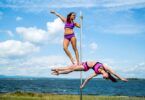Mental preparation plays a crucial role in the success of athletes and performers in competitive environments. It is not just physical prowess that determines victory; a strong and focused mindset is equally important. Engaging in effective mental preparation for competition can significantly enhance performance, boost confidence, and improve overall outcomes. In this article, we will explore key strategies and techniques that athletes and performers can employ to optimize their mental preparation and unlock their full potential in the competitive arena. Whether you are an athlete, a dancer, or a performer in any field, understanding the importance of mental readiness is paramount to achieving success. Let’s delve into the world of mental preparation for competition and discover how it can propel you towards your goals.
Navigating Pre-Competition Stress: Understanding Its Impact on Mental Readiness
The level of stress experienced before and during competitions is one of the most important factors affecting performance results. Stress is an emotion, a response to the way we perceive and evaluate a situation (f.ex. a competition). The athlete enters a state of stress, which is felt either as a dangerous and negative arousal (distress) or is perceived as a challenge positively and creatively (eustress). Pole Dancing and other Aerial Acrobatics, are no different.
Some of the factors that usually build up pre-competition anxiety are:
- Fear and Doubt about the contest results
- Personality traits (f.ex. If you are an “Anxious” type)
- Fear of negative evaluation by the “significant others”
- Fear of getting injured
- Incomplete Preparation
- Perfectionism
- Last minute changes
If the athlete feels that he/she has no control over his/her anxiety levels, then this belief will affect his/her performance negatively. If on the contrary, the athlete feels he/she can control stress and use it to his/her benefit, then stress is experienced as readiness, a positive arousing state, facilitating performance. Pre-competition anxiety is mentally perceived and physically felt.
Talking about physical, we know that when under stress, the balance between the Sympathetic (SNS) and Parasympathetic Nervous System (PNS) is disrupted.
In practice, this imbalance is translated to some well-known physical symptoms, such as:
- Rapid heartbeat and breathing
- high perspiration
- tremors
- stomach problems.
Stress can be mentally triggered by:
- The person’s negative expectations of success
- The person’s negative self–evaluation
Mental stress causes anxiety which affects:
- attention
- clear thinking
- perception
- and other cognitive processing
resulting in the athlete making mistakes, and being brought into a state of confusion and panic. In conclusion, pre-competition stress affects athletes either negatively or positively.
Getting Mentally Ready for a Competition: Strategies for a Positive Mindset
Adopt Positive Self-Talk and Thinking:
- Recognize the power of your thoughts and their impact on performance.
- Replace negative self-talk with positive affirmations to boost self-confidence.
Embrace a Growth Mindset:
- Avoid dwelling on mistakes and self-criticism.
- Visualize success and stay focused on your goals.
Cultivate Self-Knowledge:
- Understand your strengths and weaknesses.
- Build confidence by focusing on your abilities and past achievements.
Foster Optimism:
- Believe in your ability to replicate past success.
- See setbacks as temporary obstacles on your path to achievement.
Chase Your Dreams:
- Set ambitious goals and believe in your potential to achieve them.
- Put in the necessary effort and dedication to reach new heights.
Focus on Success:
- Celebrate progress and milestones during training.
- Acknowledge the improvements you’ve made and the challenges you’ve overcome.
Be Your Own Support System:
- Treat yourself with kindness and compassion.
- Imagine yourself receiving advice from a supportive mentor or role model.
By implementing these strategies and adopting a proactive approach to your mental preparation, you can enhance your performance and get mentally ready for any competition. Remember, your mind is a powerful tool, and with the right mindset and techniques, you can unlock your full potential and achieve your goals in sports and performance domains.
References: Eastbrook, J.A. (1959). The effect of emotion on cue utilazion and the organization of behavior. Psychological review, 66, 183-201. Endler, N.S. (1978). The interaction model of anxiety: Some possible impications. In D.M.Landers & R.W.Christina (Eds.), Psychology of motor behavior and sport-1977 (pp. 332-351). Champaign, IL: Human Kinetics Hanin, Y.L. (1980). A study of anxiety in sports. In W.F.Straub (Ed.), Sport Psychology: An analysis of athlete behavior (pp. 236-249). New York: Mouvement Publications Martens, R., Vealey, R.S., & Burton, D. (1990). Competitive anxiety in sport. Champaign, IL: Human Kinetics








